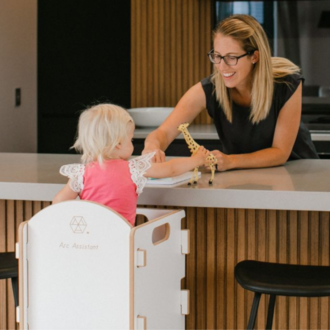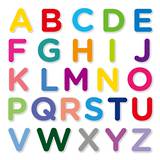How learning towers can help toddlers brain development
|
Learning towers are great for boosting your toddler so they can stand up and interact safely at bench height, whether it’s ‘helping’ with dinner, baking or doing arts and crafts alongside you. However, the potential of learning towers extends far beyond the kitchen. They also have a positive effect on your toddler’s brain development.
|
You might also be interested in ...
Do you have a gifted child?
So how do you know if you have a gifted child? We take a look at some of the characteristics of gifted children, the meaning of giftedness, whether we should recognise gifted children and what to do if you feel you child is gifted.
Teaching preschoolers the alphabet & letters
Being able to read is a vital life skill, so make the early stages of learning the alphabet as fun as possible for your preschooler. Preschoolers learn and develop best through using their whole body, all of their senses and their natural environments. You’ll find that most preschoolers begin to recognise letters when they’re about 2 to 3 years old, and are able to identify a large number of letters between 4 and 5 years old.







However, the potential of learning towers extends far beyond the kitchen.
They also have a positive effect on your toddler’s brain development.
How learning towers can help toddlers brain development
Findings from Nathan Wallis, ex-university lecturer in human development and a specialist in neuroscience, suggest that connecting with toddlers, and giving them proper stimulation and nurturing care in their first few years, are all critical for their brain development.
Innovative new learning tower, The Arc Assistant, helps massively to support this. Providing a safe place for toddlers to connect and interact with a key adult multiple times a day.
Find out more about Arc Assistant learning towers and to how purchase your own online over at Arc NZ Baby over at the Arc NZ Baby website here
The first 1000 days
From his research, Wallis discovered that crucial brain development happens in the first 1000 days of a child’s life, setting the scene for their future health and intellectual development.
He found that during their first 1000 days, a toddler’s development is significantly affected by the biological and physical environments around them.
He also found that babies and toddlers have a need for stimulation, communication and a connected relationship with one key adult during these early years.
Learning towers are a great tool to help facilitate this stimulation and connection, in what might otherwise be lost daily opportunities.
Importance of connecting with toddlers
Research suggests connecting with toddlers whilst they’re young, will have far reaching benefits when they’re older.
So exactly how does relationship security, love and connection create intelligence or a ‘clever toddler’?
Fundamentally, it is the dyad – or key adult-child relationship – that delivers connectivity, attunement, safety and predictability that enables the right conditions for the frontal cortex of their brain to develop.
Babies and toddlers do best when raised by the most responsive and attuned person available to them – regardless of gender or biology. This is very likely (for multitudes of reasons) to be their mother, but it doesn’t have to be.
Essentially, the frontal cortex of their brain will flourish when a toddler gathers data from the environment that tells them they are living in a safe world attuned with their key adult.
It is the consistent, responsive, connection with a key adult that has a calming effect on their brainstem during the first 1000 days which allows a toddler’s brain to develop.
When toddlers are encouraged to explore in a safe and supportive home environment and a nurturing child-care setting, they experience long-term benefits.
Toddlers who are read to, talked to, sung to, played with, are not only happier today, but will have better cognitive capacity later in life.
Use of a learning tower, morning, noon and night increases connectivity between a toddler and a key adult, and in turn, helps support their brain development.
Find out more about Arc Assistant learning towers and to how purchase your own online over at Arc NZ Baby over at the Arc NZ Baby website here
Article source: Arc NZ Baby